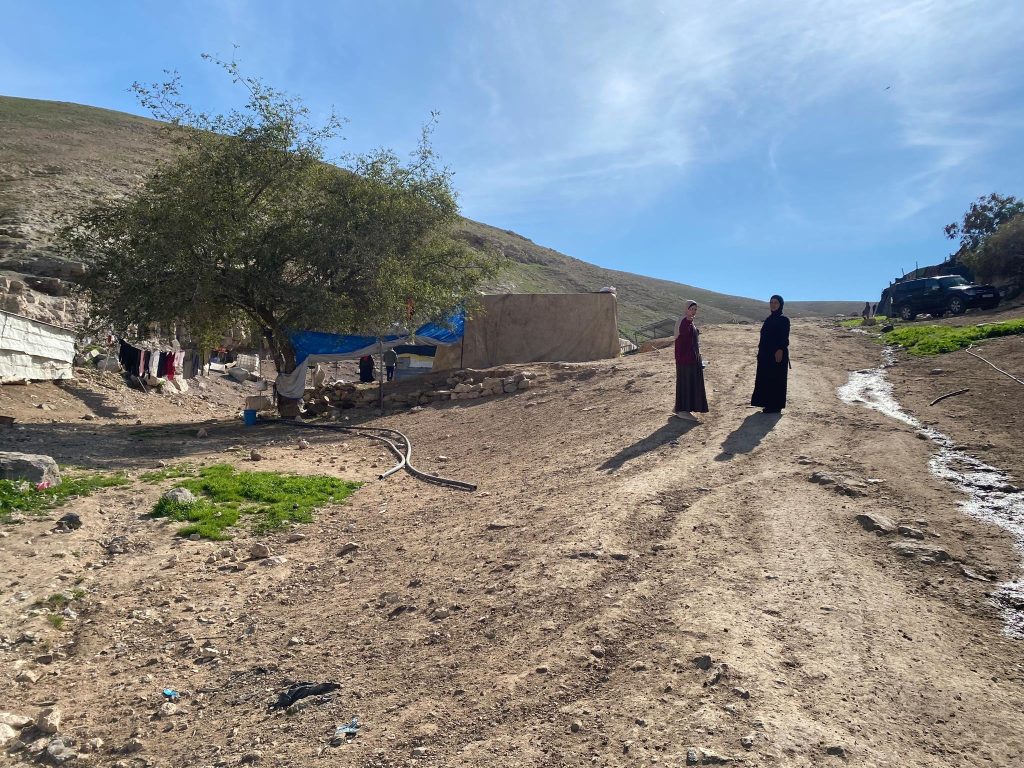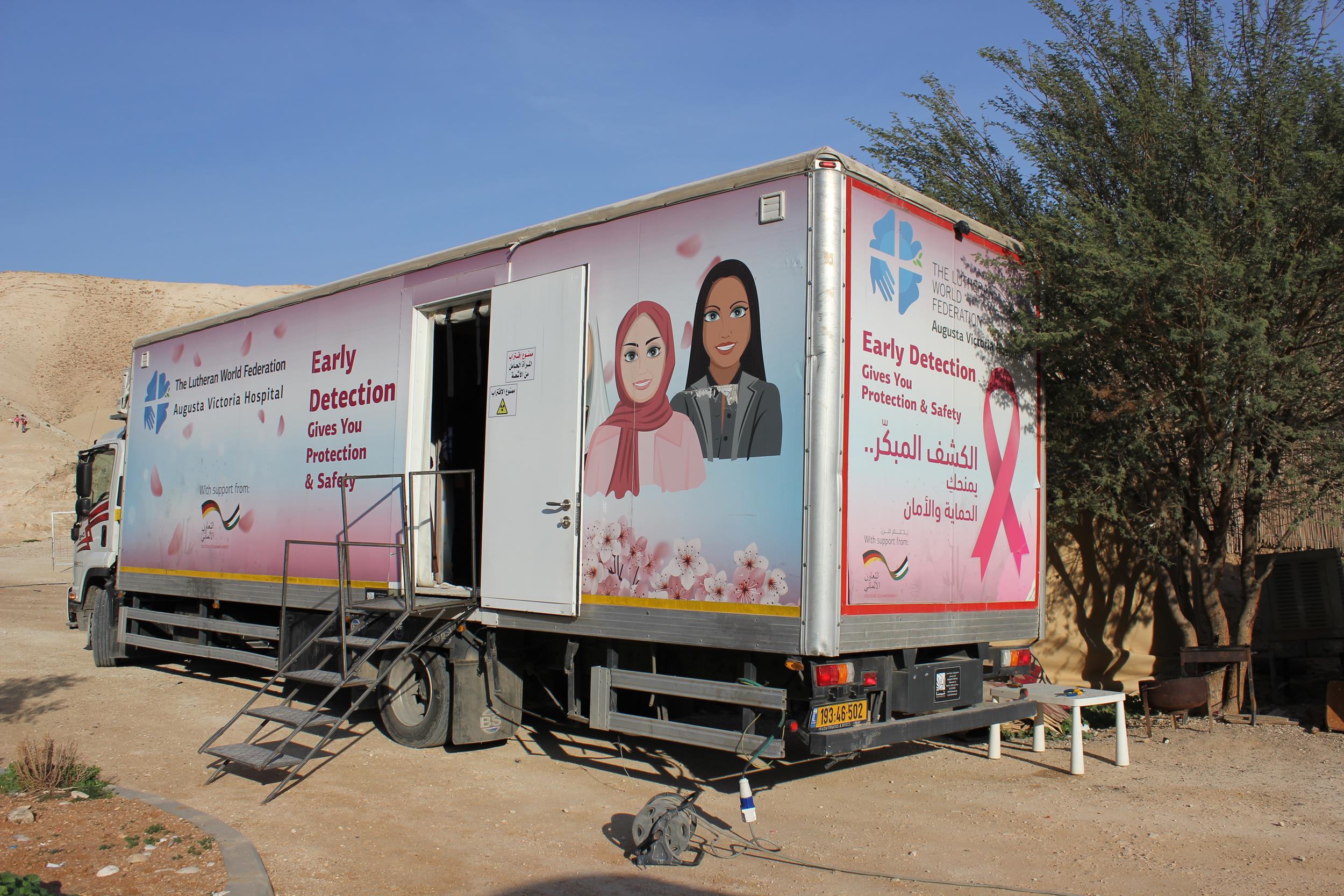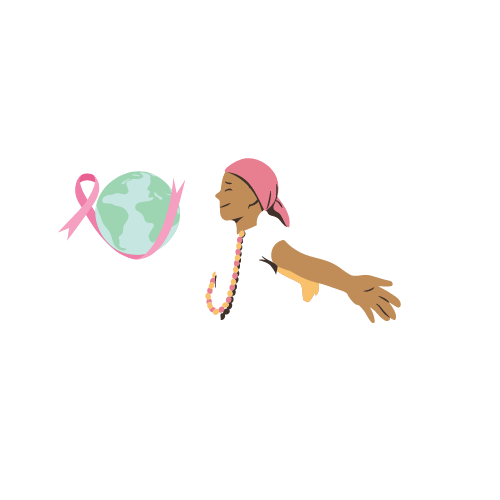Breast cancer in Palestine
Although research has made great strides on breast cancer, the lack of an effective prevention and diagnostic system in Palestine makes it a serious threat to women's quality of life.
According to the WHO, breast cancer constituted 35.6% of all cancers cases detected in Palestine in 2020, (source: World Health Organization, International Agency for Research on Cancer, Statistics 2020) and only 40% women lives up to 5 years after a cancer diagnosis (Medical Aid for Palestinians, "Breast Cancer in Occupied Palestine").
These data are alarming. Access to preventive care and practices for Palestinian women is still as a matter of fact extremely limited, for several reasons: the context of prolonged occupation, the many difficulties in accessing hospitals and medications, the fragmentation of health care in Palestine, and the lack of synergy among the professionals handling the prevention and diagnosis procedures (at a governmental, nongovernmental, and private level). In addition to these factors, there is widespread fear of breast cancer, which is perceived as a death sentence especially among younger women, who thus do not want to undergo tests or investigations.
Very few women in Palestine know how to perform a breast self-examination and are aware of the importance of having regular mammograms from age 40 up.

Prevention and treatment - AVSI's intervention for Palestinian women
AVSI, present in the West Bank since 1993, has launched the project "Fight like a girl! - Inclusive Women's Health and Breast Cancer Prevention In Palestine" thanks to the support of the Emilia-Romagna region and in partnership with the IOR Istituto Oncologico Romagnolo (the Oncology Institute of Romagna), the Municipality of Forlì and the Augusta Victoria Hospital, to ensure breast cancer prevention and treatment to women in the West Bank.
Its planned activities include supporting the mobile clinic at the Augusta Victoria Hospital - a centre of excellence in Palestine and one of the leading cancer treatment, diabetes and nephrology centers run by the Lutheran World Federation through the Jerusalem program.
Thanks to this project, 6,000 women and young girls will be able to undergo free mammography screenings and participate in information meetings in their villages.
Spending a day aboard the mobile clinic with Palestinian Bedouin communities
“A few weeks ago, on this mobile clinic, we reached out to three Bedouin communities in Wadi Qelt, near Jericho – Caterina Uboldi (Junior Project Officer of AVSI in Palestine) tells. The day began with an information meeting on breast cancer. We discussed potential risk factors (hereditary and not), how to perform a breast self-examination, what symptoms and signs may indicate the presence of the disease, and the importance of a healthy diet. Women participated with interest, asking many questions. At the end of the meeting, women over 40 were offered a free mammogram in the mobile clinic; younger women were offered a breast self-examination guided by clinic staff.”

Early intervention for Palestinian women with cancer
“The mobile clinic program can really save lives", Lana Naser El Dein (Head of the Community Outreach Program at Augusta Victoria Hospital) says. "On some days we don't find anything out of the ordinary, while on some other days we have patients who urgently need additional medical checks. In December, we went to the Hebron Governorate and performed a mammogram on a woman, and some abnormalities were detected. She could undergo an ultrasound on site, advised by an expert from the Augusta Victoria Hospital. Then, she was referred to the hospital for a biopsy, followed by a breast cancer diagnosis. This timeliness of intervention is, unfortunately, not a standard practice in the Palestinian health care system. The speed of the referral mechanism initiated by this project may have saved that woman's life."
“Fight like a girl! A program to enact the right to health for 6,000 Palestinian women
Together with prevention and screening activities in the rural areas of the West Bank with the Augusta Victoria Hospital’s mobile clinic, AVSI’s project also includes a referral mechanism for women who will need clinical investigations and home visits in the Hebron Governorate. Training and awareness-raising activities will also be carried out in the Aida and Dheisheh refugee camps, in cooperation with the Lajee Centre, a socio-cultural center in the Aida camp, and the Paul VI Effetà Institute, AVSI’s long-time partner in Palestine.
In 12 months, the project aims to reach 6,000 women with the mobile clinic (in rural areas and refugee camps), 100 women with home visits (in the governorate of Hebron) and to train the staff of Lajee Centre and the social workers of the Effetà Institute on how to promote breast cancer prevention.

February 4: World Cancer Day
World Cancer Day takes place every year on February 4th, it's promoted by the Union for International Cancer Control (UICC) and supported by the World Health Organization (WHO) to raise awareness on the disease, still a leading cause of death in the world.



